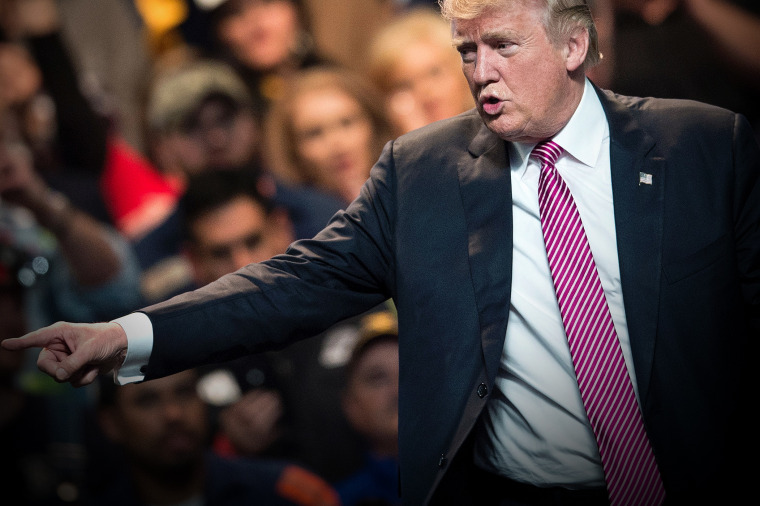When Donald Trump first started talking about tax policy last summer, his comments quickly raised eyebrows. In August, for example, the Republican candidate seemed to break with party orthodoxy on one of the Republican Party's defining issues: Trump told Bloomberg Politics that multi-millionaires are currently "paying very little tax and I think it's outrageous."
Asked if he's prepared to raise his own taxes, Trump said at the time, "That's right. That's right. I'm OK with it."
Pundits marveled at Trump's willingness to embrace economic populism and challenge some of his party's cherished assumptions -- but none of it was true. When the Trump campaign outlined the candidate's actual tax plan, it was a ridiculous, multi-trillion-dollar scheme that would slash taxes for the wealthy. A Tax Policy Center found that a low-income taxpayer would get about $128 from Trump's plan, while those in the top 0.1% would get $1.3 million.
Everyone who took Trump's rhetoric at face value was misled. What the GOP candidate said and what he actually proposed were practically opposites.
And over the weekend, it happened again.
Donald Trump made a break from conservative orthodoxy on Sunday when he backed away from proposing large tax cuts for wealthy Americans. "On my plan they're going down. But by the time it's negotiated, they'll go up," the presumptive Republican presidential nominee said on ABC's This Week. "I am willing to pay more," he said. "And you know what? The wealthy are willing to pay more. We've had a very good run."
Reading the quote, one might believe Trump is talking about increasing taxes on the wealthy -- a popular position with the American mainstream, to be sure -- the opposite of one of his policy platform's key tenets. What's more, if he did make such a pronouncement, it'd be an extremely important development, both for his campaign and for Republican politics in general.
But a closer look reveals that's really not what's happened. A lot of observers appear to have been misled by deceptive rhetoric, which is the same thing that happened in August when Trump talked about raising the wealthy's taxes shortly before he proposed cutting the wealthy's taxes.
Many in the media flubbed Trump's line on the minimum wage, and now they're flubbing his line on taxes, too. In both instances, the candidate's misleading rhetoric is driving the mistaken reporting.
To get to the bottom on this, consider this exchange yesterday between Trump and ABC's George Stephanopoulos, which is the basis for much of the confusion:
STEPHANOPOULOS: But bottom line, do you want taxes on the wealthy to go up or down? TRUMP: They will go up a little bit. And they may got up, you know... STEPHANOPOULOS: But they're going down in your plan. TRUMP: No, no, in my plan they're going down, but by the time it's negotiated, they'll go up.
But what does that mean, exactly? The presumptive Republican nominee clarified on CNN this morning that he's not proposing a tax increase on the wealthy.
The Washington Post's Greg Sargent flagged this quote from Trump's interview this morning: "Now, if I increase it on the wealthy, they're still going to pay less than they pay now. I'm not talking about increasing from this point. I'm talking about increasing from my tax proposal."
I sympathize with journalists who fell for Trump's trick; the candidate has deliberately used confusing language that has muddled the conversation. Last summer, ABC ran a headline that read, "Donald Trump Calls for Higher Taxes for Wealthiest Americans," right around the time Trump released a plan that calls for the exact opposite. It's happening again today.
But that's all the more reason to pay careful attention to the details:
1. Trump has proposed, in writing, a multi-trillion-dollar tax plan that overwhelmingly benefits the wealthiest of the wealthy.
2. When Trump talks about being open to taxes "going up a little bit" for the rich, he's talking about changes relative to his written proposal. It's a reference to the negotiations he expects to have with Congress, not a change from the status quo.
3. For Trump, the debate is about the size of the tax break for the wealthy. He believes it should be a massive tax cut, but he's open to accepting a slightly less massive tax cut.
Greg Sargent added, "There is, understandably, a strong temptation on the part of political and media observers to catch candidates out for flip-flopping or changing their positions. In the case of Trump, however, the eagerness to do this risks obfuscating more than it clarifies."
Quite right. I don't doubt that many of Trump's positions will "evolve" in the coming months, and he'll likely push back against Republican Party orthodoxy on some sacred cows. But to say Trump has endorsed higher taxes on the wealthy is simply incorrect. He's used some language that paints a misleading picture, and Trump may count on that confusion to muddle the debate, but the details cut through the con.
